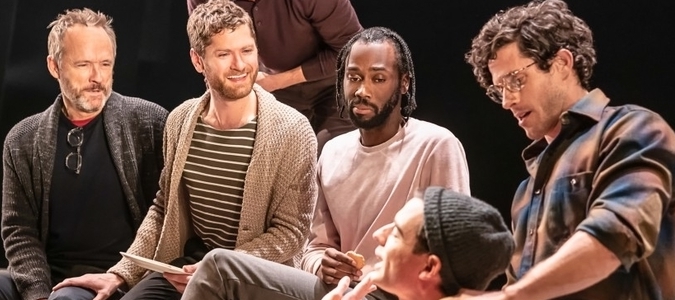

The Inheritance
Opening Night: November 17, 2019
Closing: March 1, 2020
Theater: Barrymore Theatre
In contemporary Manhattan, Eric and Toby are 30-somethings who seem to be very much in love and thriving. But on the cusp of their engagement, they meet an older man haunted by the past, and a younger man hungry for a future. Chance meetings lead to surprising choices as the lives of three generations interlink and collide—with explosive results. Brilliantly re-envisioning E.M. Forster’s masterpiece Howards End to 21st-century New York, THE INHERITANCE asks how much we owe those who lived and loved before us, questions the role we must play for future generations, and dares us to fearlessly hold on to the wild ride called life. Profoundly touching and wickedly hilarious, it’s the new play critics rave, “will make you laugh, then cry, then shake your head at its sheer, brilliant audacity.” (City AM)
BUY TICKETSREAD THE REVIEWS:
November 17, 2019
But there’s no easy way to say the following: Part 2 of The Inheritance climbs nowhere near the peak of the Part 1 closer, any more than Kushner’s Perestroika could live up to that Angel smashing through the ceiling and into Millennium Approaches. The convoluted romantic entanglements, plot developments and loose-end-tying, driven in part by our knowledge that one character – we know who – will not survive the play, keeps interest from flagging. But some of the larger questions the play raises prove more intriguing in the asking than the answering. Chiefly, as Forster himself asked, what do we owe ourselves, our families and the larger community? To whom are we responsible? Are we our brothers’ keepers?
READ THE REVIEWNovember 17, 2019
Ambition and achievement are not entirely commensurate in “The Inheritance.” Its breadth doesn’t always translate into depth. As fine as the acting is throughout — and quietly brilliant when the extraordinary veteran Lois Smith takes the stage, toward the very end, as the show’s sole female character — none of the characters here have the textured completeness of those created by Forster and Kushner. Ultimately, the play twists itself into ungainly pretzels as it tries to join all the thematic dots on its immense canvas. Yet even by the end of the overwrought second half of “The Inheritance,” you’re likely to feel the abiding, welcome buzz of energy that comes from an unflagging will to question, to create, to contextualize, to — oh, why not? — only connect.
READ THE REVIEWNovember 17, 2019
But even when the playwright’s hand becomes too visible, the talk too diffuse and the monologues a little too much like showpieces, the depth of feeling in Lopez’s drama is frequently ravishing and the writing utterly gorgeous. The grounding humanism has its roots in Forster, but the humor, empathy and insightful observation of contemporary gay Manhattanites in their 20s and 30s — a generation that came out when the devastating plague years of the AIDS crisis already were being archived away as history — are very much Lopez’s own. The play is both wonderfully funny and exquisitely poignant, but its real achievement is the deft hand with which it connects multiple generations of gay men, underscoring the importance of sharing stories and keeping the past alive. That binding tissue forms a dialogue between today’s young gay men — who have embraced their sexual identities during an era of gay marriage and wide cultural representation, when HIV has become a more treatable illness — with older men who fought for gay rights and endured the scourge of AIDS. Or didn’t.
READ THE REVIEWNovember 17, 2019
The real hero of “The Inheritance,” Matthew Lopez’s thoughtful, moving and painfully funny play, is E.M. Forster, the celebrated English author of “Howards End,” “A Room with a View,” “A Passage to India,” and “Maurice,” that last a gay-themed novel published after his death in 1970. It’s quite the literary thrill to find the great writer alive and onstage (and called here by his middle name, Morgan) in Lopez’s free-form borrowings from and musings on “Howards End.” As played with searching intelligence by Paul Hilton, who originated the role at the Young Vic and in its Oliver Award-winning West End transfer, Morgan/Forster emerges as a brilliantly talented writer and an achingly sensitive man. Stephen Daldry (“An Inspector Calls,” “Billy Elliot”) directs this epic two-parter in a sinuous manner that suits the playwright’s flowing thoughts, and gives his characters the freedom to roam, to learn and, eventually, to grow. Designer Bob Crowley assists with a sleek set — a flat white surface of infinite playing space, with scenes and settings defined by Jon Clark’s sharp lighting design — that makes complex movement look like a walk in the park.
READ THE REVIEWNovember 17, 2019
The Inheritance is in many ways a ghost story: It is set among a group of gay men in present-day New York City, but it is animated by spirits of the past. Foremost among them is the English novelist E.M. Forster (the marvelous Paul Hilton), whom Matthew Lopez’s script—like Forster’s friends—calls Morgan. In the prologue, when the play’s characters are fishing for a way to tell their story, Forster appears to them as a plummy, chummy guide. So begins Lopez’s intimate Broadway epic: a searching, expansive and sometimes very moving exploration of love, money, community and memory.
READ THE REVIEW























